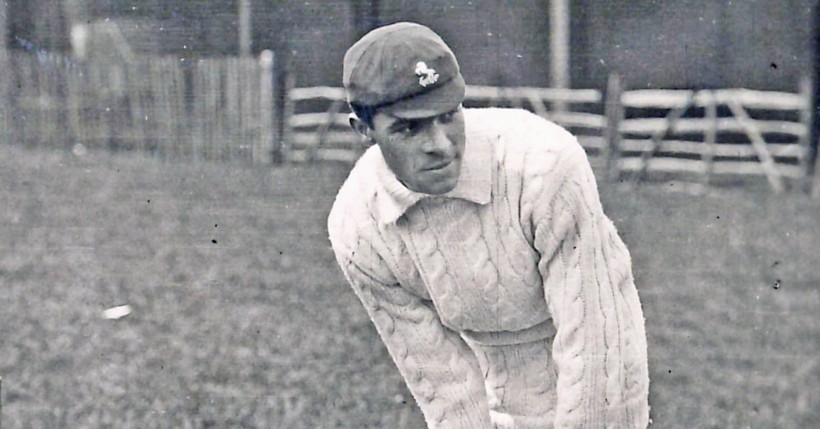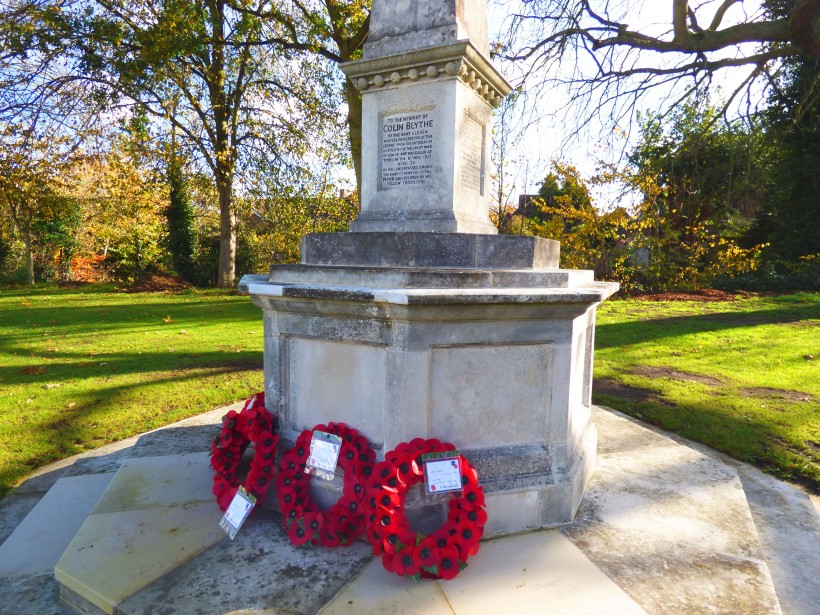Kent Remembers: David Jennings
Wednesday 9th November 2022

Born: 4.6.1889, Kentish Town, London. Died: 6.8.1918. Tunbridge Wells.
Kent 1909-1914. Kent cap (no. 71), 1911.
More perhaps than any other Kent cricketer of his time, David Jennings’ career suffered from the Club’s policy at the time of always attempting to include a minimum of three amateurs – more often than not batters. If never perhaps scoring quite enough runs to become an unquestioned choice for the First Eleven, he had nevertheless done more than enough to justify selection over most run of the mill Public School/Oxbridge batters, few if any of whom were likely to play county cricket for very long.
One of the best cover points in the country, too often he found himself relegated to 12th man.
He came from a cricketing background. His Dover-born father, also David, played for Devonshire from 1892 to 1914, umpired minor counties matches and for some years was groundsman at Exeter. From 1905 till his death in 1938 he was coach and head groundsman at Marlborough College.
David junior was professional at the Mote and living in Maidstone when he came to Kent for a trial.
He joined the staff in 1908, beginning well with scores of 48 v Middlesex Second Eleven at Lord’s and 22 and 24 v Surrey at The Oval. 1909 began even better with 62*, 52 and seven for 21 v Middlesex Seconds, again at Lord’s and six for 26 v Surrey at The Oval. For the Mote he scored 175 v Free Foresters and 129 v Eton Ramblers.
In all matches for Kent Second Eleven, Club & Ground and the Mote he scored over 1,600 runs and claimed 98 wickets at 12 runs apiece.
Obviously a player of more than average promise, he was chosen for one county match, v Surrey at The Oval in which he scored four.
He played two first team games in 1910 (with a top score of 18 ) but did better in the Second Eleven with four half-centuries, the highest 98 opening the batting v Essex at Hythe.
Jennings missed the early May fixtures in 1911 but was chosen for the first team in June. After failing against Gloucestershire at Gravesend, he was out of the side for the next six games but returned with 53* v Leicestershire at Dover, sharing an unfinished seventh-wicket partnership of 112 with Fred Huish (46*).
He was dropped again for the match against the Indians but returned to score 64 and 104* in 115 minutes v Somerset at Tunbridge Wells, participating in two more century fifth-wicket partnerships – 141 with Woolley (104) in the first innings, 241* with Woolley (148*) in the second.
He was capped but, surprisingly, was not chosen again that year. For the Second Eleven he scored 173 v Cornwall at Hythe.
On his next first team appearance, against Hampshire at Southampton in May 1912, Jennings hit 100 in 105 minutes but was dropped after one more match and played only five more games that season.
Although picked for 11 matches in each of the two final pre-war seasons, for the first time Jennings disappointed. He hit one more century, 106 v Essex at Tunbridge Wells in 1914, but there were six ducks and 15 other scores under 20.
On the outbreak of the Great War he enlisted in the Kent Fortress Engineers at the same time as his brother Thomas, Colin Blythe, Henry Preston and Claud Woolley and was posted to the Woodlands Depot in Gillingham.
By March 1915 he had been promoted to Second Corporal and although a hernia necessitated a month in hospital, he spent most of the next 18 months on coastal defence and construction duties. Like Blythe and his other former colleagues he found time to play for the Kent Fortress Engineers cricket team and in June 1916 hit 97 against Argyll House, a Canadian team.
In May 1917 he was among a batch transferred from the KFE to the Royal Engineers. In that year he made two appearances at Lord’s; for the Army against the AIF he scored 26 and made 11 opening the batting with Wally Hardinge for the Army & Navy against Australian & South African Services.
In February 1918 he was posted to the Western Front with 206 Field Company, RE and employed mainly on construction duties, On 9 April during the German Spring offensive, Corporal Jennings was one of 19 men of 206 company who became casualties in a gas shell bombardment near Bienvillers, North West of Arras. With eyes, throat and chest seriously affected, he was evacuated to England and spent two months in hospital.
Two weeks after his release he was admitted to St Mark’s Miltary Hospital, Broadway Down, Tunbridge Wells with pleurisy.
Despite further treatment, his condition deteriorated.
His death certificate lists cause of death as ‘Gas Poisoning in France. 2. Double pleuropneumonia five weeks’.
A hard-driving batter with a method similar according to some experts, to that of ‘Patsy’ Hendren, his best years as a cricketer were clearly still ahead of him had he recovered.
Given that Colin Blythe had already indicated his intention of taking up a career in coaching and Hutchings had played his last match in 1912, Jennings’ death was Kent’s heaviest loss during the Great War.
Two of Jennings’ brothers were professional cricketers, George for Warwickshire (1923-1925) and Devon (1925-1927), Thomas, a left-arm spinner who had a trial for Kent but went to Surrey (1921-1924) and Devon (1926-1933). From 1935 to 1962 Thomas was a Minor Counties umpire.
A third brother Leonard played two first-class matches for the Royal Air Force and appeared for the RAF in wartime charity matches.
Profile adapted from Derek Carlaw’s ‘Kent County Cricketers: A to Z, 1806-1914’
Previous profiles of Kent Cricketers that fell during both World Wars include:
Colin Blythe
Gerry Chalk
Arthur Du Boulay
Eric Hatfeild
Kenneth Hutchings
David Jennings
Lawrence Le Fleming
Geoffrey Legge
Lionel Troughton
George Whitehead

